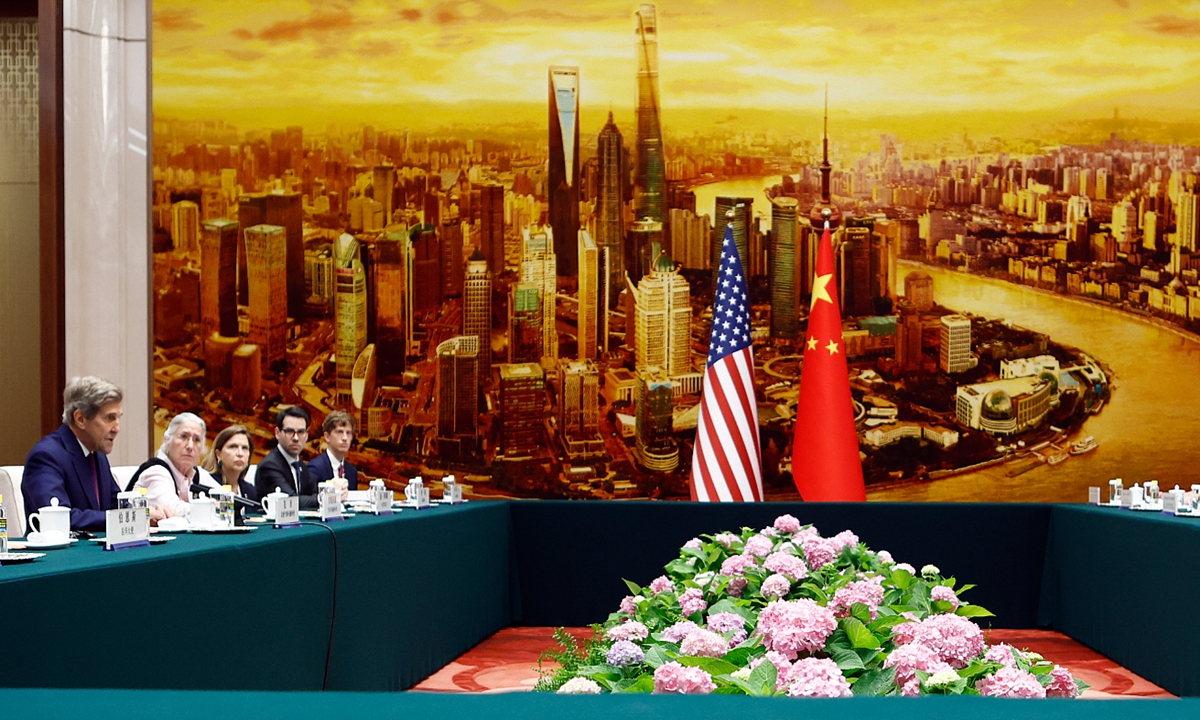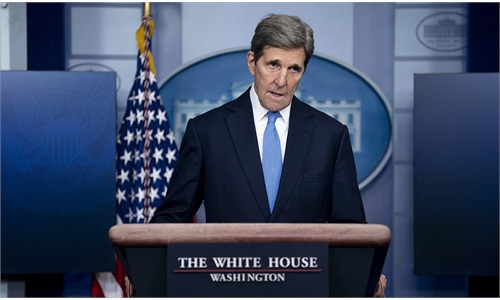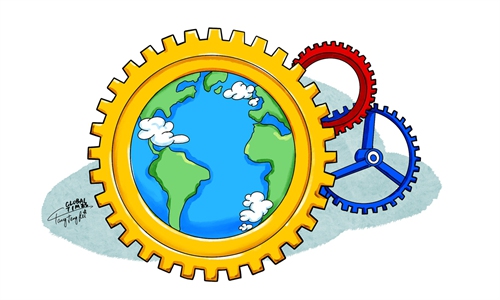Senior Chinese officials talk to Kerry, ‘show sincerity’ on climate
‘Atmosphere of cooperation hinges on temperature of China-US ties’

Photo:VCG
Senior Chinese officials met with visiting US climate envoy John Kerry on Tuesday in the hope of enhancing dialogue and communication to tackle the joint challenge of climate change, an area with bilateral cooperation potential.
However, as cooperation on climate involves not only the climate issue itself but also supply chain and technologies related to new energy and green transformation, climate cooperation can be advanced only when the overall China-US relations are heading in a positive direction and when the US stops industry and technological containment of China, experts said.
In addition to frequent China-US interactions in recent weeks including the visits by US Secretary of State Antony Blinken and Treasury Secretary Janet Yellen to Beijing, one signal worth noting is that Chinese State Councilor and Defense Minister Li Shangfu met with Henry Kissinger, the centenarian former US secretary of state, in Beijing on Tuesday. Both sides emphasized the necessity of a stable, predictable and constructive relationship, which is essential for world peace, stability and prosperity.
Some experts also believe that as an influential old friend of China, Kissinger could play an important role in helping pave the way to the resumption of military-to-military communication between the two countries.
Premier Li Qiang, during his meeting with Kerry on Tuesday, said that both China and the US should implement the consensus of the two heads of state through practical actions, properly manage differences, and promote the early return of China-US relations to a healthy and stable development track.
Li said the current global task of addressing climate change is daunting, and it requires all countries, including China and the US, to strengthen coordination, build consensus, and take vigorous action to form a collective response to climate change to the greatest extent possible. And it's important to uphold multilateralism and stick to the objectives and principles set by the UN Framework Convention on Climate Change and its Paris Agreement.
Countries should assume their respective responsibilities, abide by the principle of common but differentiated responsibilities, with developed countries taking the lead in reducing emissions and fulfilling their financial commitments as soon as possible, and developing countries making contributions within their capabilities, Li said.
Also on Tuesday, Wang Yi, director of the Office of the Foreign Affairs Commission of the CPC Central Committee, said that China is willing to strengthen dialogue and communication with the US to explore mutually beneficial cooperation and jointly address climate change when he held talks with Kerry.
China-US cooperation on climate change enjoys great potential. But this cannot be achieved without the understanding and support of the two peoples and the general environment of China-US relations, Wang said.
It is hoped that the US side will pursue a rational, pragmatic and positive China policy, continue to adhere to the one-China principle, properly handle the Taiwan question, and work with China by upholding mutual respect, peaceful coexistence and win-win cooperation, Wang noted.
Wu Xinbo, director of the Center for American Studies at Fudan University, told the Global Times on Tuesday the US should show sincerity rather than making superficial gestures in climate cooperation.
China-US cooperation on climate change was "forced" to be put on hold because of the provocative visit of former US house speaker Nancy Pelosi to the island of Taiwan in August 2022. Wang mentioned the Taiwan question to Kerry to remind the US that it should learn the lesson, not make the mistake again, Wu said.
'Good platform'
"Currently, climate cooperation can play a positive role in improving China-US relations: It is an area that China and US can work together and are not completely opposite; many Democratic lawmakers who are negative on China are supportive of the climate cooperation," Wu said.
Lü Xiang, research fellow at the Chinese Academy of Social Sciences, told the Global Times on Tuesday that climate change is a very good platform for the two countries to cooperate as it involves many other aspects including technology and new energy. If the US is sincere about it, climate cooperation could help resume cooperation in many other sectors. "But so far, it looks like this is not US' desire."
China's special envoy for climate change Xie Zhenhua on Monday had several talks with Kerry that totaled nearly 12 hours, according to media reports.
The long conversations between Xie and Kerry, both technocrats devoted to resolving climate change, indicate the complexity of climate cooperation between China and the US, Ma Jun, director of the Beijing-based Institute of Public and Environmental Affairs, told the Global Times on Tuesday.
Ma said Kerry's meetings with Li Qiang and Wang Yi further proved that climate change cooperation can never be isolated from the overall bilateral relationship. "The atmosphere of climate change cooperation hinges on the climate of China-US ties; and it is such ties that truly decide whether the cooperation expressions both sides have agreed on can be fully implemented."
During their meeting, Li told Kerry that to cope with climate change, technological achievements should be shared to promote global green and low-carbon transformation, and developed countries should provide more technological support to developing countries.
It is hoped that China and the US will continue to uphold the spirit of cooperation, respect each other's core concerns, seek common ground while putting aside differences through full communication, explore more practical mechanisms of cooperation, promote multilateral climate governance, and ensure the full and effective implementation of the Paris Agreement, Li said.
"If the US truly wants to cooperate with China in climate change, it should not suppress some sectors where China has the advantages, for example, the battery production for electric vehicle," Lü said.
The Biden administration's plans to restrict investments in China will be narrowly focused on cutting-edge technology, new investments, and probably won't go into effect until next year, Bloomberg reported on Monday. The restrictions possibly prohibit investment in China's semiconductor, quantum-computing and artificial intelligence sectors while sparing the biotechnology and energy sectors.
Through Kerry's visit, there is more room for future climate cooperation and prospects of further negotiation on details and technical terms, experts said.
"But it is hard to say how much concrete progress can be achieved, as there are still huge uncertainties and little trust between China and the US," Ma said, "For example, we are greatly concerned about the US' flip-flopping on climate issue due to its own domestic political tussle."
Kerry's trip can be seen as truly productive if both sides agree to push forward the implementation of mutually agreed terms, such as to establish a joint working group on climate change, Ma said.
Lü, far from optimistic, said that with the US' chaotic mentality, it's almost unrealistic to expect that Kerry's visit would change the overall atmosphere of the China-US relations, even though China has already "put its sincerity on the table."


